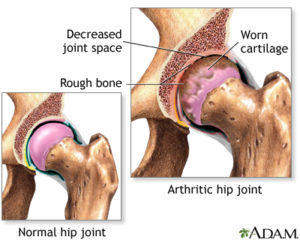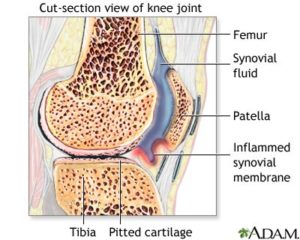Arthritis |
||
DefinitionArthritis is inflammation of one or more joints. A joint is the area where 2 bones meet. There are more than 100 different types of arthritis. Alternative NamesJoint inflammation; Joint degeneration CausesArthritis involves the breakdown of cartilage. Normal cartilage protects a joint and allows it to move smoothly. Cartilage also absorbs shock when pressure is placed on the joint, such as when you walk. Without the normal amount of cartilage, the bones rub together. This causes swelling (inflammation), and stiffness. Joint inflammation and damage may result from:
In most cases, the joint inflammation goes away after the cause goes away or is treated. Sometimes, it does not. When this happens, you have long-term (chronic) arthritis. Arthritis may occur in men or women. Osteoarthritis is the most common type. Other, more common types of inflammatory arthritis include:
SymptomsArthritis causes joint pain, swelling, stiffness, and limited movement. Symptoms can include:
Exams and TestsThe health care provider will perform a physical exam and ask about your medical history. The physical exam may show:
Some types of arthritis may cause joint deformity. This may be a sign of severe, untreated rheumatoid arthritis. Blood tests and joint x-rays are often done to check for infection and other causes of arthritis. The provider may also remove a sample of joint fluid with a needle and send it to a lab to be checked. TreatmentThe goal of treatment is to reduce pain, improve function, and prevent further joint damage. The underlying cause often cannot be cured. LIFESTYLE CHANGES Lifestyle changes are the preferred treatment for osteoarthritis and other types of joint swelling. Exercise can help relieve stiffness, reduce pain and fatigue, and improve muscle and bone strength. Your health care team can help you design an exercise program that is best for you. Exercise programs may include:
Your provider may suggest physical therapy. This might include:
Other things you can do include:
MEDICINES Medicines may be prescribed along with lifestyle changes. All medicines have some risks. You should be closely followed by a doctor when taking arthritis medicines. Over-the-counter medicines:
Prescription medicines:
It is very important to take your medicines as directed by your provider. If you are having problems doing so (for example, because of side effects), you should talk to your provider. Also make sure your provider knows about your all the medicines you are taking, including vitamins and supplements bought without a prescription. SURGERY AND OTHER TREATMENTS In some cases, surgery may be done if other treatments have not worked. This may include:
Outlook (Prognosis)A few arthritis-related disorders can be completely cured with proper treatment. Most forms of arthritis however are long-term (chronic) conditions. Possible ComplicationsComplications of arthritis include:
When to Contact a Medical ProfessionalCall your provider if:
PreventionEarly diagnosis and treatment can help prevent joint damage. If you have a family history of arthritis, tell your provider , even if you do not have joint pain. Avoiding excessive, repeated motions may help protect you against osteoarthritis. ReferencesBope ET, Kellerman RD. Rheumatology and the musculoskeletal system. In: Bope ET, Kellerman RD, eds. Conn’s Current Therapy 2016. Philadelphia, PA: Elsevier Saunders; 2016:chap 9. Davis JM, Matteson EL, American College of Rheumatology, European League Against Rheumatism. My treatment approach to rheumatoid arthritis. Mayo Clin Proc. 2012;87(7): 659-673. PMID: 22766086 www.ncbi.nlm.nih.gov/pubmed/22766086. Khanna D, Khanna PP, Fitzgerald JD, Singh MK, et al. 2012 American College of Rheumatology guidelines for management of gout. Part 2: therapy and anti-inflammatory prophylaxis of acute gouty arthritis. Arthritis Care Res (Hoboken). 2012;64(10):1447-1461. PMID: 23024029 www.ncbi.nlm.nih.gov/pubmed/ 23024029. Singh JA, Furst DE, Bharat A, et al. 2012 update of the 2008 American College of Rheumatology recommendations for the use of disease-modifying antirheumatic drugs and biologic agents in the treatment of rheumatoid arthritis. Arthritis Care Res (Hoboken). 2012;64:625-639. PMID: 22473917 www.ncbi.nlm.nih.gov/pubmed/22473917. |


